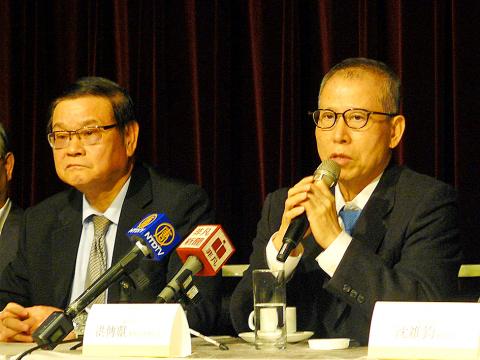Solar cell maker Neo Solar Power Energy Corp (新日光能源) yesterday said it has received government support to finance a three-way merger in the latest restructuring efforts — worth NT$5 billion (US$168.92 million) — to boost profitability by penetrating all levels of the solar supply chain.
It is a strategy created by Neo Solar and local partners Gintech Energy Corp (昱晶能源) and Solartech Energy Corp (昇陽光電) to counteract price volatility in the solar cell market by rapidly diversifying into a lucrative solar system installation business.
“We are not forming a big solar cell alliance,” Neo Solar chairman Sam Hong (洪傳獻) told a media briefing yesterday. “We are creating a different business model — a winning formula — via this three-in-one merger.”

Photo: CNA
Within five years after the merger, the new entity, which is to be named United Renewable Energy Co (UREC, 聯合再生), seeks to generate between NT$90 billion and NT$100 billion in revenue, almost doubling current revenue of NT$50 billion, Neo Solar said.
The solar system installation business would be the greatest source of revenue at about 50 percent, while solar cell and solar module businesses would constitute the remaining 50 percent, the company said.
UREC aims to build solar power plants with a capacity of 1 gigawatt (GW) each year past the initial five-year period, said Gintech president Pan Wen-whe (潘文輝), who is to serve as chief executive officer.
The merger should be completed in the third quarter of this year, Hong said, adding that he did not expect the merger to face major obstacles from the world’s competition watchdogs as the new company would only install 5GW of solar cell capacity a year.
Hong’s remarks about creating a new business model is aimed at alleviating public concern that the government’s investment might end up with a zero return as all three solar cell makers are struggling to make a profit amid steep pricing competition from China and anti-dumping probes from the global community.
The government might inject more capital than the NT$4 billion fund into UREC through the government’s National Development Fund and government affiliate Yao Hua Glass Co (耀華玻璃).
The government fund and Yao Hua would each hold through a private placement less than 6.5 percent of the company’s shares, because the government wants to play a smaller role than UREC’s biggest private shareholder, Delta Electronics Inc (台達電), which is to hold a 6.5 percent stake.
UREC also plans to raise additional funds by issuing new shares.
The company is to concentrate on installing solar systems for clients, while manufacturing solar cells, solar modules and solar wafers at lower costs due to falling raw material sourcing costs and better productivity, Hong said.

Taiwan will prioritize the development of silicon photonics by taking advantage of its strength in the semiconductor industry to build another shield to protect the local economy, National Development Council (NDC) Minister Paul Liu (劉鏡清) said yesterday. Speaking at a meeting of the legislature’s Economics Committee, Liu said Taiwan already has the artificial intelligence (AI) industry as a shield, after the semiconductor industry, to safeguard the country, and is looking at new unique fields to build more economic shields. While Taiwan will further strengthen its existing shields, over the longer term, the country is determined to focus on such potential segments as

UNCERTAINTY: Innolux activated a stringent supply chain management mechanism, as it did during the COVID-19 pandemic, to ensure optimal inventory levels for customers Flat-panel display makers AUO Corp (友達) and Innolux Corp (群創) yesterday said that about 12 to 20 percent of their display business is at risk of potential US tariffs and that they would relocate production or shipment destinations to mitigate the levies’ effects. US tariffs would have a direct impact of US$200 million on AUO’s revenue, company chairman Paul Peng (彭雙浪) told reporters on the sidelines of the Touch Taiwan trade show in Taipei yesterday. That would make up about 12 percent of the company’s overall revenue. To cope with the tariff uncertainty, AUO plans to allocate its production to manufacturing facilities in

COLLABORATION: Given Taiwan’s key position in global supply chains, the US firm is discussing strategies with local partners and clients to deal with global uncertainties Advanced Micro Devices Inc (AMD) yesterday said it is meeting with local ecosystem partners, including Taiwan Semiconductor Manufacturing Co (TSMC, 台積電), to discuss strategies, including long-term manufacturing, to navigate uncertainties such as US tariffs, as Taiwan occupies an important position in global supply chains. AMD chief executive officer Lisa Su (蘇姿丰) told reporters that Taiwan is an important part of the chip designer’s ecosystem and she is discussing with partners and customers in Taiwan to forge strong collaborations on different areas during this critical period. AMD has just become the first artificial-intelligence (AI) server chip customer of TSMC to utilize its advanced

Chizuko Kimura has become the first female sushi chef in the world to win a Michelin star, fulfilling a promise she made to her dying husband to continue his legacy. The 54-year-old Japanese chef regained the Michelin star her late husband, Shunei Kimura, won three years ago for their Sushi Shunei restaurant in Paris. For Shunei Kimura, the star was a dream come true. However, the joy was short-lived. He died from cancer just three months later in June 2022. He was 65. The following year, the restaurant in the heart of Montmartre lost its star rating. Chizuko Kimura insisted that the new star is still down